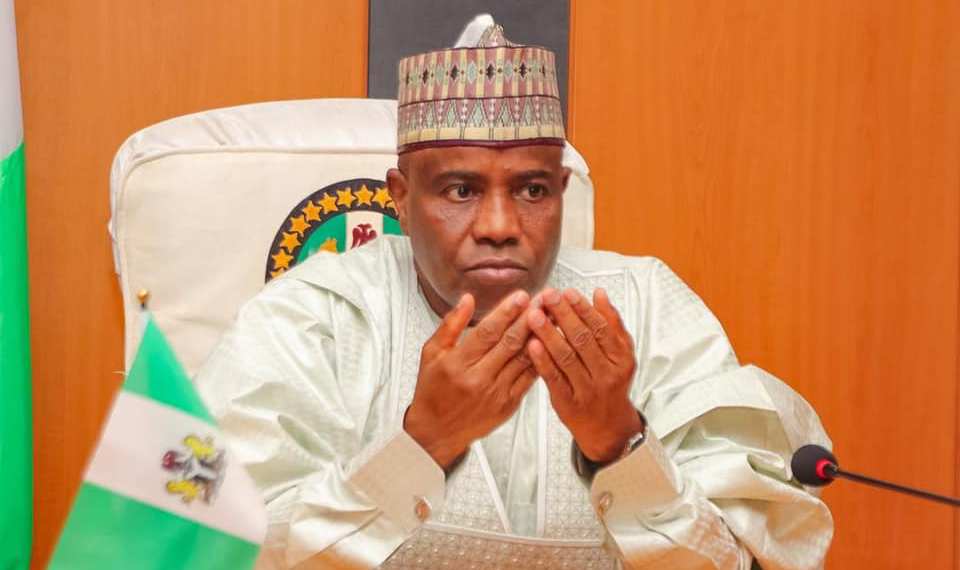The recent arrest of former Sokoto State governor, Aminu Waziri Tambuwal, by the Economic and Financial Crimes Commission (EFCC) has drawn sharp reactions from prominent figures across Northern Nigeria, sparking debate over the impartiality of Nigeria’s anti-corruption war and raising fears of political witch-hunting.
Tambuwal, a former Speaker of the House of Representatives and two-term governor, was detained on Monday at the EFCC headquarters in Abuja over allegations of fraudulent cash withdrawals totalling ₦189 billion during his tenure. Investigators claim he violated provisions of the Money Laundering (Prevention and Prohibition) Act, 2022.
However, the arrest has triggered widespread controversy, with political leaders, activists, and civic groups expressing divergent views.
Allegations of political bias
Several political figures and groups have condemned the EFCC’s move, calling it politically motivated. The Peoples Democratic Party (PDP) and the African Democratic Congress (ADC) described the arrest as an attempt to silence opposition voices.
Former Vice President Atiku Abubakar accused President Bola Tinubu’s administration of using the EFCC as a tool to intimidate opposition leaders. Similarly, former Labour Party presidential candidate Peter Obi criticised the arrest, insisting that Nigeria’s anti-corruption efforts must be conducted transparently and without bias.
READ ALSO: Tambuwal: Tinubu using EFCC to harass, intimidate, decimate opposition – Atiku
The Human Rights Writers Association of Nigeria (HURIWA) also condemned the development, describing it as a partisan tactic that could erode public trust in the anti-corruption process.
In response, the EFCC maintained that its operations remain non-partisan, stating that it enforces the law irrespective of political affiliation. A spokesperson for the commission said it would continue to pursue all corruption cases with due diligence, regardless of the individuals involved.
Voices from the North
Northern activist and commentator, Mahdi Shehu, in an exclusive interview, described the arrest as “evidence of the EFCC dancing naked,” accusing the agency of political bias and selective prosecution.
“If it’s not political, why arrest Tambuwal now, while people like Godswill Akpabio, Bello Matawalle, Aliyu Wamakko, and over 43 per cent of National Assembly members with fraud charges remain untouched?” Shehu queried.
He further accused the EFCC of turning a blind eye to high-profile corruption scandals involving allies of the current administration, including the unaccounted ₦210 trillion reported by the Senate Public Accounts Committee in relation to the Nigerian National Petroleum Company Limited (NNPCL), and the missing $7 billion earmarked for refinery rehabilitation.
Shehu also criticised the agency’s silence over the recent display of luxury by Minister of Power, Bayo Adelabu, claiming the EFCC lacked the “liver, guts, or courage” to investigate individuals closely linked to the presidency.
“A day will come when the hunter becomes the hunted,” he warned, adding that the EFCC operates under a system where “some Nigerians are more Nigerian than others.”
Adnan Mukhtar Tudunwada, a former aspirant for the Kano State House of Assembly, echoed similar sentiments. He labelled Tambuwal’s arrest “purely political and very unfortunate,” accusing the EFCC of abandoning fairness in its anti-corruption mandate.
“Many APC members with corruption allegations are left untouched, while opposition figures are targeted and intimidated,” he said. Tudunwada believes the arrest is connected to Tambuwal’s recent criticisms of the Tinubu administration.
Calls for objectivity
Amidst the political uproar, some voices have called for a more balanced view. Public affairs advocate Rabiu Musa urged Nigerians to focus on the core of the issue.
“Did Tambuwal commit an offence that warranted his arrest? That should be the question. We must not let politics overshadow the law,” Musa said.
Looking ahead
The arrest of Tambuwal has added fuel to Nigeria’s already charged political atmosphere, with the EFCC once again at the centre of national debate. As the case unfolds, observers will be watching closely to see whether the anti-graft agency can demonstrate impartiality and rebuild public confidence in its operations.
For now, Tambuwal’s fate remains uncertain, but one thing is clear — the political reverberations from his arrest are likely to linger.



